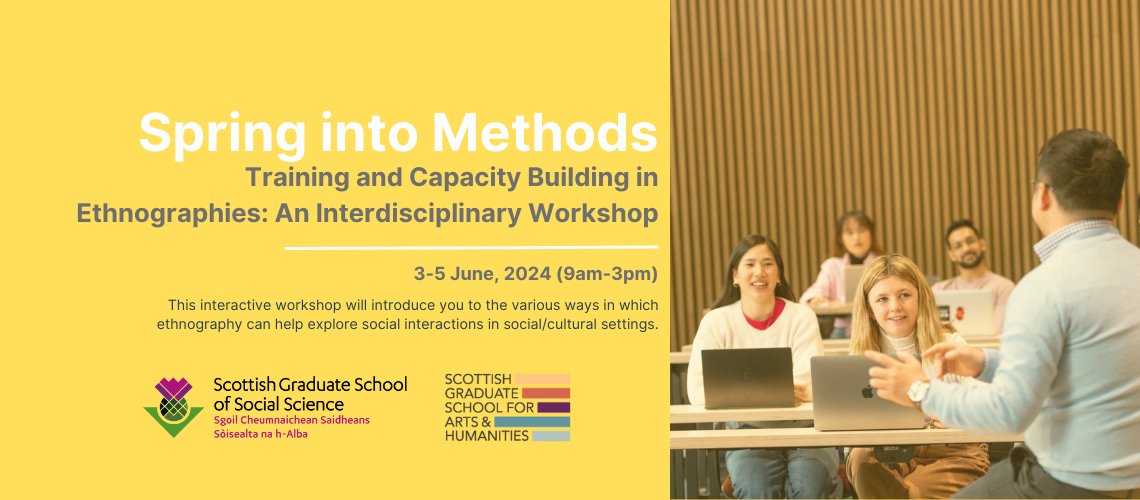This event introduces participants to ethnographic research, and specifically ‘pure’ ethnography, visual- and mobile-ethnography, autoethnography, and netnography. This fully interactive event will interest students planning to write about groups of people in social settings. No prior learning is required, yet some orientation to qualitative research methods would be beneficial. We will explore the nuances of ethnographic approaches using examples from our own research, and using the students’ research contexts.
The aims of the event are to:
1. Comprehend ethnography as a multidimensional research technique and demystify its meaning
2. Learn about ethnographic procedures using examples from netnography, autoethnography and visual and mobile-ethnography
3. Prepare various research designs for ethnographic research based on research problems that participants will identify
4. Acquire skills in writing about, and publishing ethnographic research
After taking part, students will be able to:
• LO1: Define the goals and objectives of ethnographic research
• LO2: Distinguish between different ethnographic approaches
• LO3: Apply the concepts of ethnography, netnography, visual- and mobile-ethnography and autoethnography to their own research
• LO4: Appreciate the strengths and limits of ethnographic approaches
The first two days will see the course team introduce the broad concepts and terms that will be used throughout the duration of the event. Students will be asked to identify research that they are currently undertaking which might be compatible with ethnographic approaches. These contexts will shape the approach to subsequent interactive discussions.
The event will be delivered by four researchers, two of whom are ECRs with a track record of using ethnographic methods.
Dr Craig Wight is an Associate Professor in the Business School who has authored works over 18 years on the discourses of genocide heritage. His recent work includes two netnographic studies of European Holocaust heritage.
Dr Phiona Stanley’s research is all about mobilities and how people engage in ‘intercultural’ settings in the broadest sense. This includes research on working abroad, intercultural education, and tourism, particularly outdoors sport/leisure/mobilities.
Dr Gesthimani Moysidou is a lecturer in Tourism and Hospitality Management. Her research interests are in mobilities, gender and sociocultural perspectives of tourism / hospitality.
Dr Alex Witte is a Lecturer in Sustainable and Natural Area Tourism. Her research interests include mobilities, nature-based experiences, gendered, and sociocultural discourses experiences in tourism and leisure.
The first two days of the event will take place in a face-to-face setting, on campus at Edinburgh Napier University. Day 3 will take place fully online via MS Teams, and live captioning will be enabled to widen participation. Lunch and refreshments will be provided on days 1 and 2.
The event will be interactive, and we will use breakout areas and practical activities to allow students to engage with ethnographic approaches and reflect on the potential value of these for their own research. A self-directed learning experience at a visitor attraction in Edinburgh will be arranged for the evening of day 1 to allow students to apply participant observation as an ethnographic technique. With the addition of this practical activity students will be empowered to explore a common technique within mobile ethnographies. By introducing an explicit session on visual/mobile ethnography, we will provide an even more inclusive overview of possible methodological choices participants might make.
Please Note:
In order to manage the volume of interest for Spring into Methods in a fair and equitable way, we ask that you submit a registration of interest form (below) to indicate you wish to participate in this workshop. Submitting a registration of interest does not automatically guarantee your place in a workshop. Once you submit your registration of interest, you will receive a confirmation email within 1 business day.
We will review all registrations of interest and we will be in touch w/c 01 April to confirm whether or not you have been allocated a place in this workshop. If you are allocated a place on the workshop, you will receive a confirmation email and event details will be sent to you ahead of the event. If you are not allocated a place in this workshop, we will email to let you know and will continue to hold your position on the wait list should a place become available.
You may submit a registration of interest for up to two Spring into Methods workshops. If you have submitted an expression of interest in another workshop, you will receive any communications about that workshop separately.


